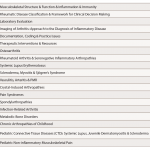Fundamentals of Rheumatology Course
The ACR is proud to announce the newest online offering: Fundamentals of Rheumatology Course. This course meets the needs of nurses, office managers, medical assistants, and other clinicians that are entering or returning to a rheumatology practice. It provides an overview of rheumatic disorders and insurance preauthorization. For more information, go to www.rheumatology.org/education/Prof MeetingCourses/frconlinecourse.asp.
Nurse practitioners (NPs), physician assistants (PAs), and other health professionals who have taken the ACR’s Advanced Rheumatology Course (ARC) find that specialized rheumatology training offers distinct benefits. Course participants cite enhanced caregiver–patient interactions, patient evaluations, patient education, and practice productivity as outcomes of the course.
The Advanced Rheumatology Course
The ARC is a series of 19 web-based modules offering in-depth knowledge of rheumatology along with practical clinical skills to physicians, fellows-in-training, nurse practitioners, physician assistants, and other clinicians who care for patients with or at risk for rheumatic disease and musculoskeletal conditions. Developed by leaders in the field of rheumatology, the ARC meets the need for comprehensive rheumatology training identified by the ACR and the ARHP.
The modules, divided into three tracks (adult, pediatric, and combined), feature four components:
- A preassessment of the participant’s knowledge of a specific rheumatology topic;
- A lecture presentation that includes audio-annotated PowerPoint slides;
- Clinical tip sheets that can be printed out to use in a clinic or practice setting; and
- A posttest to assess what a participant has learned.
Upon completion of the course, the graduate should be able to assess and manage patients with rheumatic diseases, outline the scope of practice of the healthcare professionals in managing rheumatic diseases, and describe the impact of rheumatic diseases on individuals and society.
Achieving these learning objectives enables graduates to incorporate the acquired knowledge and skills into their practices quickly with less on-the-job training time.
The specialized course is also designed to be convenient for enrollees. The online format allows individuals to participate from work, from home, or while traveling. With 12 months to complete the course, each individual can spend the time needed on each module with no specific required timeframe other than the individual’s personal schedule. But what do course graduates think of the training? The Rheumatologist spoke with several health professionals who have completed the ARC to see how the training has affected how they care for patients.
Positive Feedback from Graduates
Why take the course? Health professionals who complete the ARC have expanded their knowledge about rheumatology and have integrated their newly acquired knowledge and skill sets into their practice.



